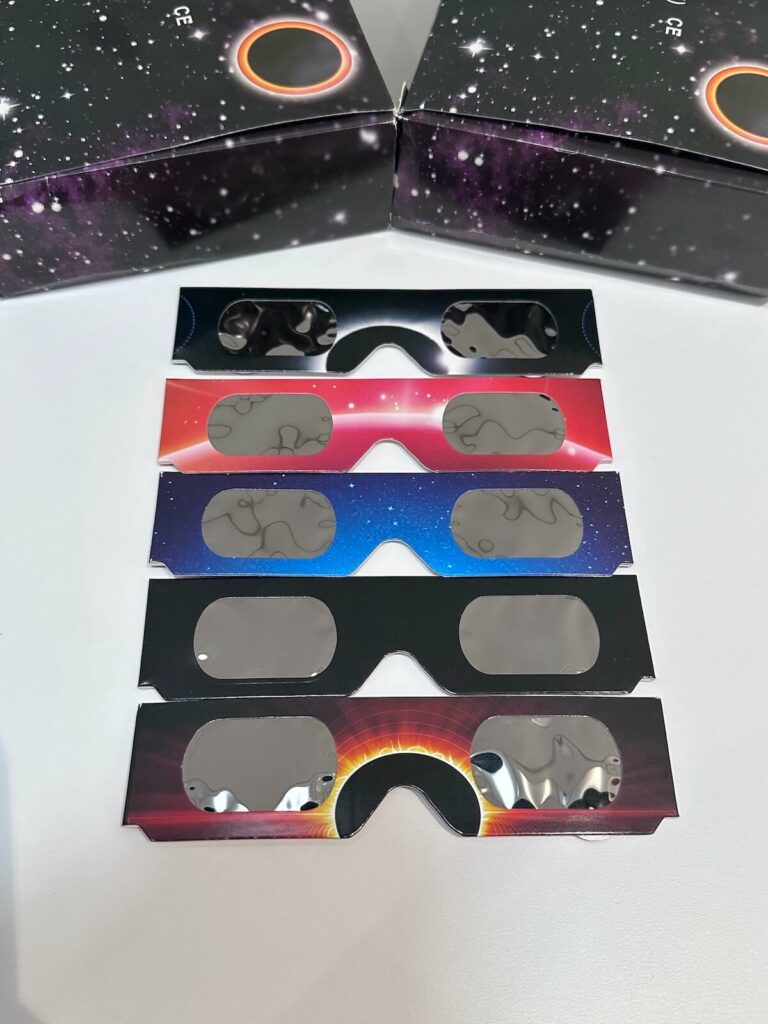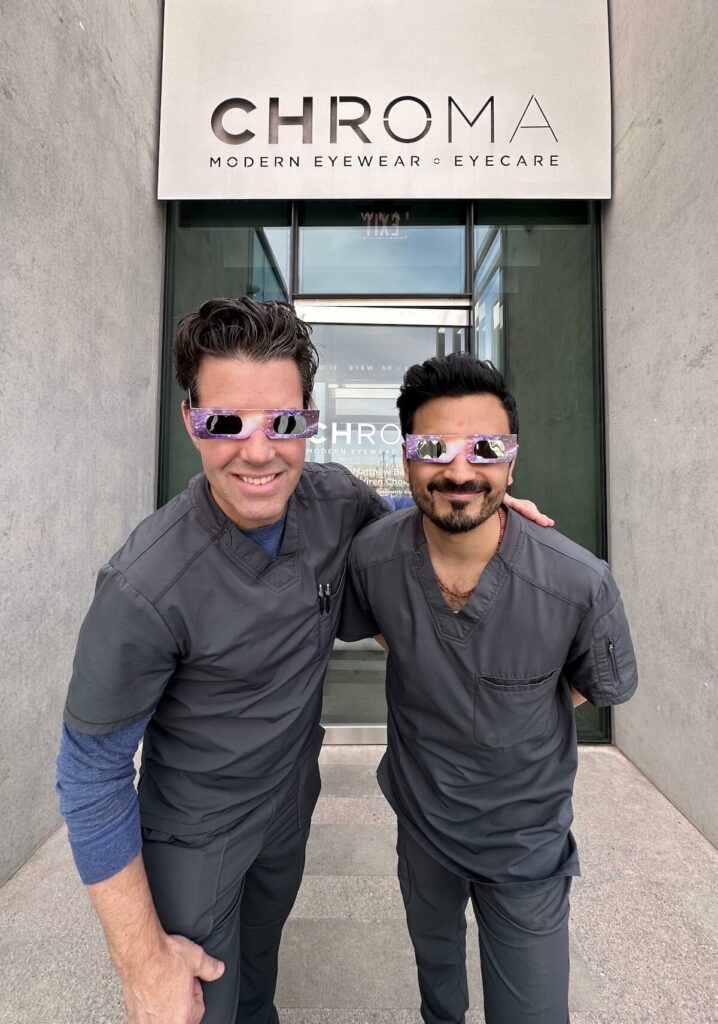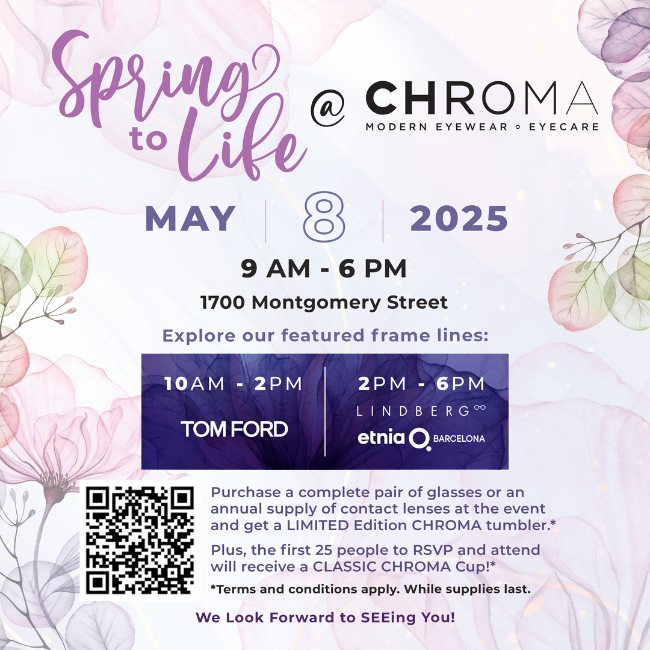On April 8, 2024, Fort Worth will have the pleasure of experiencing a complete solar eclipse. At 1:41 PM, the moon will fully cover the sun, blocking out the sun’s light and revealing its corona, the outer atmosphere.
You won’t want to miss this spectacular sight—it will only last for 2.5 minutes—but even during a total eclipse, looking directly at the sun is dangerous for your eyes and can cause permanent retina damage. It is important to use appropriate eye protection to avoid the risk of eye damage.
Polarized sunglasses are designed to reduce glare, improve contrast, and protect your eyes, but they’re not intended for viewing a solar eclipse. Even the most expensive sunglasses can’t shield your eyes enough for this event.
Your friendly eye care team at CHROMA modern Eyewear Eyecare will hand out solar eclipse glasses to anyone visiting the clinic before April 8. We love any excuse to see you in person, but please call us if you have any questions!
What Are Polarized Glasses?
Polarized sunglasses are specially designed to reduce glare and enhance visual clarity, particularly in bright sunlight. They use a unique filter that blocks intense reflected light caused by reflective surfaces like water, snow, or roads.
By minimizing glare, these polarized lenses improve comfort and visibility during activities like driving, fishing, or skiing. They also enhance contrast and reduce eye strain, creating a more pleasant outdoor experience.
Many polarized sunglasses also offer protection against ultraviolet (UV) radiation. While they provide significant benefits in various outdoor settings, polarized lenses may only be suitable for some situations. They’re not ideal for pilots, as they can affect instrument panel visibility and make it tricky to see certain LCD screens on devices like phones or ATMs.
How the Sun Affects Your Eyes
The sun’s ultraviolet radiation can harm your eyes. It happens fast, too—within minutes. Conditions like surfer’s eye, cataracts, corneal sunburns, and some cancers can all be traced back to excessive, unprotected sun exposure.
The retina (the light-sensitive tissue at the back of your eye) is particularly vulnerable to UV radiation. Over time, sun exposure can lead to macular degeneration, an eye disease that causes central vision loss, impacting daily activities like reading and driving. The retina also doesn’t feel pain, so you might not realize the damage you’re experiencing until it’s too late.
The symptoms of sun damage include:
- Blurry vision
- Trouble focusing
- A spot in the center of your vision
- Headaches
- Watering eyes
- Redness
Looking at the sun straight on, even briefly, can cause permanent eye damage. Solar eclipses are particularly dangerous because looking at the sun becomes easier, but the damage to your eyes is just as severe.

What to Use Instead of Polarized Glasses
There are several safer alternatives to polarized glasses for observing a solar eclipse.
The best option is specially-made eclipse glasses. These glasses are specifically designed for this purpose and have solar filters that safeguard your eyes during a solar eclipse. Unfortunately, counterfeit eclipse glasses do exist, so make sure your eclipse glasses are safe to use before the big day.
Our team at CHROMA is handing out eclipse glasses to anyone who visits our location before April 8. Come by and get yours!
If you can’t make it, use a welding mask or goggles with shade 12 or higher protection are also an option.
Why Polarized Sunglasses Aren’t Enough
Polarized sunglasses simply aren’t up to the task of protecting your eyes during an eclipse. They don’t offer the specific level of protection required for looking directly at the sun during an eclipse.
The sun’s UV and infrared (IR) rays can penetrate through polarized lenses, but the specialized filters in solar eclipse glasses block out a much higher percentage of these dangerous rays.
Approved Solar Filters
Specialized solar filters should meet international safety standards and have:
- An ISO 12312-2:2015 certification
- The manufacturer’s name and address are printed somewhere on the product
Do not use solar filters that are:
- Missing ISO certification information
- Torn, scratched, or have wrinkled lenses
- Loose in their frames
- Made before 2015
Prioritize Eye Safety When Viewing a Solar Eclipse
When it comes to witnessing the incredible rarity of a solar eclipse, protecting your eyes is paramount. Don’t miss out on the upcoming total eclipse on April 8th. Visit CHROMA today and secure your pair of solar eclipse glasses. To witness the wonder of a solar eclipse without compromising your eye health, get in touch with us.



